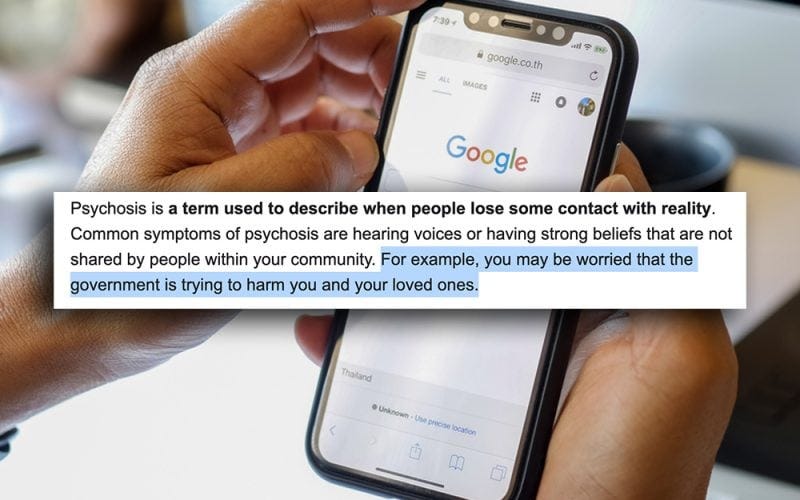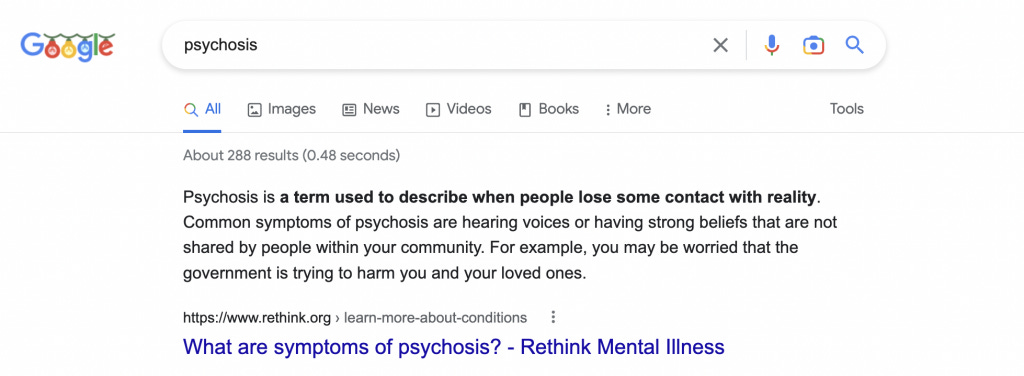Google 'Psychosis' & You Get: "You May Be Worried That The Government Is Trying To Harm You."
A lack of a good faith effort into understanding each other's perspectives and 'steel manning' each other's arguments produces cultural division that's destroying our society. Simply said, if we don't actually listen to what each other is saying because we are protecting our own views and opinions, we'll never make meaningful progress. I talk about this in my (sensemaking episode of the CE Podcast here.)
This sentiment applies to this article because some in society would rather wipe out important evidence and questions with "that sounds crazy," and this simply isn't a good faith effort at sensemaking.
Generally, the mainstream loves to believe that the alternative, "did my own research" crowd is causing havoc, but they themselves actually play a big role in this as well.
I typed in 'psychosis' on Google only to find a returned result that looked like this:
As a note: you may not get this same result, but I have checked with several others who did.
Psychosis is certainly a real thing, I know this partly because I've spent the last three years getting training certifications in various areas of mental health. It's typically characterized by delusions, hallucinations, disorganized speech, disorganized or catatonic behavior, and/or negative symptoms.
There are several problems I have with the way ReThink is trying to characterize people under this definition. And the fact that Google has it as their number one result that gets featured is problematic.
1. My next 3 points stem off the basis of accepting what will occur as a result of my first point here.
It feels irresponsible to take a basic and widespread belief that "people don't trust their government," and tie it in so closely with a mental illness by means of the statement "government is trying to harm you." It is way too easy for people to simply jump to "oh ya that sounds like anti-vaxxers or anti-maskers. Or anyone who questions government." This irresponsible generalization of people is how you dehumanize them.
On this basis, a better example the definition above could provided is: "For example, you may be worried that you are being followed all the time, but have no evidence to explain this to others."
This is much more accurate and clear, and doesn't divisively lump in hundreds of millions of people. It distinguishes a degree of rarity and proportionality with this diagnosis that is lost in the previous one.
Let's also look at "Strong beliefs that are not shared by people in your community." How often have we overturned ideas? How often do people ignore truths for years only to have them become self evident years down the road? Look at the UFO phenomenon. A "no-no" for decades is now widely accepted in mainstream culture. But those that spoke about it before that were "crazy." We saw the same thing with government mass surveillance programs.
My issue here is that this definition easily stigmatizes individuals and subject matter without curiosity and good faith exploration. From here, all else builds.2. For the definition provided to be true, one would have to be very specifically in an unhinged state where they noticeably feel they are in very real danger at the hands of their government, and there is no evidence to back it up. They would also be rather paranoid about it. This wouldn't be a casual "ya I think the government doesn't truly care about us" - a feeling MANY people have as a result of government actions.
Further, many begin to believe their government doesn't care about them because they refuse to widely acknowledge and intelligently converse about COVID vaccine injuries for example. This action on the part of government sows doubt in people's minds about transparency and honesty, it's a denial of fact. Then when government continues to not acknowledge issues, people begin to wonder why. THAT is why they have this perspective about government, not because of psychosis.
3. It generalizes a very common feeling many people have, without any nuance. As a result many people will simply state: anyone who doesn't trust the government is mentally ill. It makes it sound as if there is no point in hearing out credible arguments that surround COVID vaccines, for example, because many who support them believe that those who are cautious about them must be because they think their government is trying to kill them.
Yet most people who are cautious feel the government is making a big mistake here and has credible evidence to support it. They commonly feel the government simply doesn't want to own up to their overselling of vaccine safety and is protecting corporate profits - something they've done thousands of times over. Cigarettes, Oxycontin, DDT etc. This is no different.
This lack of honest inquiry is common and seen with the Conspirituality podcast for example. A podcast widely reported on by The New York Times and other major media outlets that seeks to debunk conspiracy theories coming from the wellness community. But it lacks a good faith effort to understand and present arguments coming from those who they oppose. Often times the hosts are laughing at and pointing to mental illness of those who question COVID vaccines for example. But they leave out journalistic rigor and subject matter expertise to land in their positions. This behavior is common and has a massive cultural impact.
This how everyone simply gets lumped together as crazy. The lowest common denominator is used to cancel out the rest. Qanon used to debunk vaccine hesitancy. And the lowest common denominator is often not suffering from psychosis, but is just bad at critically thinking and gets swept away by their emotions. (This is why I am often so outspoken about being in your body, processing emotions, and thinking carefully about the characters people get their information from.)
It feels as though the masses have been trained, through ideas like the definition above, that to question government means you are unhinged, are into Qanon, or you are like Alex Jones.
Simply put, by not steel manning arguments (which is to seek evidence and a best position on an issue) and hearing out of those who question government narratives, and instead simply make fun of them or state they have mental illness, we are shutting down societal conversations and ignoring truths all at once.
Websites like The Pulse, and our other brand Collective Evolution, have been demoted from appearing in Google search results since 2019. Instead, these "credible" websites are promoted - even though their framing of issues is heavily one sided and misleading. But the ideas resonate with what the general community thinks is right?
This all said, I wrote an entire essay on the subject of conspiracy culture and how using poor evidence and a lack of critical thinking will make it much harder to present true, yet controversial, ideas to those who don't yet know something. It's called "Conspireality: Is It Time For a Serious Conversation?" I highly recommend checking it out as I do not believe the idea here is to "go to war" with mainstream thinking.
In fact, I believe we are all connected in more ways that we realize and coming together in good faith is what needs to occur - not more attacks and fighting. Maybe it is best to not treat "them" how they treat you. Or perhaps I'm naive, but I'll stick with my heart for now.
I also invite you to explore the idea of becoming more in tune with yourself and your body to navigate stress, emotions and conversation more productively in this chaotic time. My 5 Days of YOU Challenge can be taken here.




